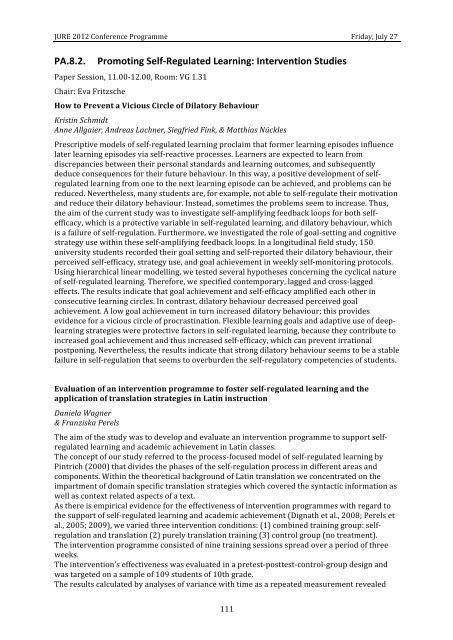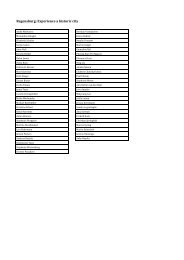JURE 2012 Programme book - EARLI Jure 2012
JURE 2012 Programme book - EARLI Jure 2012
JURE 2012 Programme book - EARLI Jure 2012
Create successful ePaper yourself
Turn your PDF publications into a flip-book with our unique Google optimized e-Paper software.
<strong>JURE</strong> <strong>2012</strong> Conference <strong>Programme</strong> Friday, July 27<br />
PA.8.2. Promoting Self-‐Regulated Learning: Intervention Studies<br />
Paper Session, 11.00-‐12.00, Room: VG 1.31<br />
Chair: Eva Fritzsche<br />
How to Prevent a Vicious Circle of Dilatory Behaviour<br />
Kristin Schmidt<br />
Anne Allgaier, Andreas Lachner, Siegfried Fink, & Matthias Nückles<br />
Prescriptive models of self-‐regulated learning proclaim that former learning episodes influence<br />
later learning episodes via self-‐reactive processes. Learners are expected to learn from<br />
discrepancies between their personal standards and learning outcomes, and subsequently<br />
deduce consequences for their future behaviour. In this way, a positive development of self-‐<br />
regulated learning from one to the next learning episode can be achieved, and problems can be<br />
reduced. Nevertheless, many students are, for example, not able to self-‐regulate their motivation<br />
and reduce their dilatory behaviour. Instead, sometimes the problems seem to increase. Thus,<br />
the aim of the current study was to investigate self-‐amplifying feedback loops for both self-‐<br />
efficacy, which is a protective variable in self-‐regulated learning, and dilatory behaviour, which<br />
is a failure of self-‐regulation. Furthermore, we investigated the role of goal-‐setting and cognitive<br />
strategy use within these self-‐amplifying feedback loops. In a longitudinal field study, 150<br />
university students recorded their goal setting and self-‐reported their dilatory behaviour, their<br />
perceived self-‐efficacy, strategy use, and goal achievement in weekly self-‐monitoring protocols.<br />
Using hierarchical linear modelling, we tested several hypotheses concerning the cyclical nature<br />
of self-‐regulated learning. Therefore, we specified contemporary, lagged and cross-‐lagged<br />
effects. The results indicate that goal achievement and self-‐efficacy amplified each other in<br />
consecutive learning circles. In contrast, dilatory behaviour decreased perceived goal<br />
achievement. A low goal achievement in turn increased dilatory behaviour; this provides<br />
evidence for a vicious circle of procrastination. Flexible learning goals and adaptive use of deep-‐<br />
learning strategies were protective factors in self-‐regulated learning, because they contribute to<br />
increased goal achievement and thus increased self-‐efficacy, which can prevent irrational<br />
postponing. Nevertheless, the results indicate that strong dilatory behaviour seems to be a stable<br />
failure in self-‐regulation that seems to overburden the self-‐regulatory competencies of students.<br />
Evaluation of an intervention programme to foster self-‐regulated learning and the<br />
application of translation strategies in Latin instruction<br />
Daniela Wagner<br />
& Franziska Perels<br />
The aim of the study was to develop and evaluate an intervention programme to support self-‐<br />
regulated learning and academic achievement in Latin classes.<br />
The concept of our study referred to the process-‐focused model of self-‐regulated learning by<br />
Pintrich (2000) that divides the phases of the self-‐regulation process in different areas and<br />
components. Within the theoretical background of Latin translation we concentrated on the<br />
impartment of domain specific translation strategies which covered the syntactic information as<br />
well as context related aspects of a text.<br />
As there is empirical evidence for the effectiveness of intervention programmes with regard to<br />
the support of self-‐regulated learning and academic achievement (Dignath et al., 2008; Perels et<br />
al., 2005; 2009), we varied three intervention conditions: (1) combined training group: self-‐<br />
regulation and translation (2) purely translation training (3) control group (no treatment).<br />
The intervention programme consisted of nine training sessions spread over a period of three<br />
weeks.<br />
The intervention’s effectiveness was evaluated in a pretest-‐posttest-‐control-‐group design and<br />
was targeted on a sample of 109 students of 10th grade.<br />
The results calculated by analyses of variance with time as a repeated measurement revealed<br />
111



